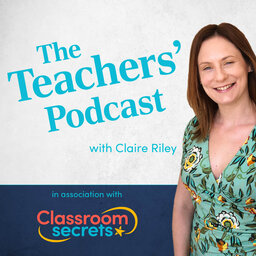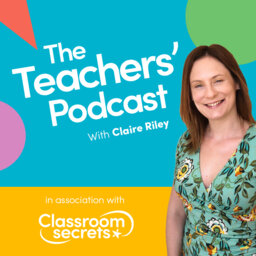Alistair Bryce-Clegg (Founder of ABC Does): Play-based learning in schools
In this episode, Claire talks to Alistair Bryce-Clegg, a former headteacher and now founder of 'ABC Does', a consultancy company that delivers training promoting the importance and power of play-based learning.
Alistair talks about the significance of play-based learning in Early Years settings and Year 1, as well as how it helps children develop cognitively, academically and socially. He starts by explaining his teaching journey and how his family of teachers inspired him to take the same career path.
He offers advice and guidance from his experience of working with Early Years practitioners in a range of settings including child-minders, day nurseries, schools, academies and home educators from around the world. Over the past eleven years he has developed his consultancy by offering training and conferences, in addition to support in the classroom setting. Alistair also speaks about how teachers should support children in the upcoming academic year after such a long period of time away from school due to the pandemic.
KEY TAKEAWAYS
- Early Years to Year 1 transition
Alistair talks about how empowered children are when they leave Reception as they can choose their own tasks, resources, make their own snacks etc. However, often when they go into Year 1, it suddenly becomes adult-focused teaching followed by tabletop activities. He talks about the importance of continuing this play-based and investigative learning for children’s development and the association it has with progress and attainment. - Play-based learning
Alistair talks about the importance of play-based learning and the impact it has on children’s development. He talks in detail about how it supports pupils’ learning and cognitive development. Pupils can develop skills that cannot always be achieved through adult-focused teaching. He also speaks about how the assessment of this can be done by teachers, for example, if they should observe or if they should develop pupils’ understanding through questioning. - Child-led learning approach
Alistair talks in detail about how he led his school as a deputy and headteacher to foster a child-led learning approach. He talks about his journey including the successes and mistakes and what he has learnt from them. He talks about how he worked as a team with his staff to ensure they are delivering the best approach and teaching to the children’s’ needs. - Pressures of Year 1
As a consultant, Alistair considers the pressures Year 1 teachers face such as the phonics screening test and ensuring children’s attainment is high as they work towards the end of Key Stage 1 tests. He underlines the importance of adapting and fostering a play-based learning approach in Early Years and Year 1 to support children’s cognitive development and attainment. - Play-based learning catering for all abilities
Alistair highlights the significance of ensuring play-based learning is set out correctly. He believes that, regardless of a child’s ability, if the play-based learning is rigorous enough, it can meet the needs of a disengaged learner and a more able learner. - Role play area
When creating and designing role play areas, it is vital to understand the purpose of the display. Alistair talks about understanding the aim behind putting up a display and how it will help the children’s development. Teachers should think about the experiences children will have, and the skills they want children to develop, from the display or area. The conventional displays and resources should be avoided such as a sand tray if it serves no purpose towards the children’s learning and development. - Taking your time to understand pupils
Given the current situation, Alistair emphasises the importance of teachers taking their time getting to know their pupils and supporting their wellbeing. He is encouraging teachers to ensure children’s wellbeing is their first priority, especially during the current circumstances with the coronavirus. He believes if the primary focus is not on children’s wellbeing, the battle for this will continue throughout the coming year. If children feel supported and safe, they will be able to progress faster cognitively and in terms of their maturity. It is essential that the play-based learning approach offers open and ambiguous provision as well as focused learning that can be related to topic work. - Going forward
Alistair believes children should be given ample opportunities for talk to help the transition into the new academic year as well as allowing children the opportunity to talk about their experience during the pandemic. Children should be provided with the opportunity to explore through continuous provision and play-based learning.
BEST MOMENTS
“[The placement teacher] single-handedly made me love early years in the period of a nine-week placement.”
“She just worked magic with [the early years children] to the point where she had them literally eating out the palm of her hands, because she understood them, and they loved her.”
“By the end of that placement, I got to a point where I thought, ‘no this is where I want to be’, because when I began to see the skill that was involved in it, and also appreciate that, actually, it’s not the end of the primary learning journey where the important learning happens, it’s the beginning bit. If you get that wrong, you are making it harder for every teacher that comes after you.”
“So you have a responsibility to get it right in Early Years because you are creating these curious, critical thinkers who want to investigate and explore and be resilient and have an opinion and be independent. All of those things are in our power in Early years.”
“All of that huge independence and creativity is not utilised and, because they don’t utilise it, they forget it and stop doing it. So how this really powerful play-based transition from Reception to Year 1, for me, if it’s done well, the attainment that those children achieve or the progress they achieve is always significantly better.”
“High level engagement has got a direct correlation to high level achievement and attainment. So, if you can keep their engagement high, then you have the potential to get a really good achievement. If anything is going to keep their engagement high, play and investigative learning as opposed to a very last-century chalk-and-talk activity.”
“One of the reasons why I love Early Years is because you get to teach a lot. You’re not just delivering, you are teaching.”
“We really evaluated practice, trying to discuss and really drill what we meant by child-based learning. We kept saying we have fostered a child-led learning approach, but if you said to the team, me included, can you actually articulate what do you mean by child-led learning it was a really difficult thing for us to explain.”
“The internet makes the world so much of a small place. You get to share with an eclectic range of people who have different views and ideas and opinions. You can take all that in and that, ultimately, improves your practice.”
“Just have twenty minutes in a reception or nursery class and you’ll feel great.”
“Play is an effective vehicle for learning. It’s not something you do before the learning starts or after the learning has finished. It’s not a holding space waiting for an adult coming to teach you something and it’s not what you go on to to keep you busy while I’m teaching somebody else. It’s acknowledging that ‘A’, developmentally children learn way better through play-based approach if there is rigour in your play. And ‘B’, play brings a high-level of engagement which links directly to high level of attainment.
“This environment that I have created based on observation and assessment is going to engage these children in discovery-based learning. It’s going to keep them inquisitive. It’s going to keep them in the moment.”
“If your provision is rigorous enough, if you’ve got challenge in play, that 5-year-old who’s progressed well down their learning journey should flourish even better because play is encouraging creative critical thinking, resilience, independence, social interaction, plan, execute. All of those things you don’t get to do with a worksheet.”
“Behaviour is never the child. Behaviour is always a symptom of something a child is trying to process or articulate but can’t.”
“Wellbeing has to be at the very top of everyone’s list always.”
“Children don’t articulate in an obvious way. A lot of the time they will articulate in a very abstract way.”
“The pedagogy for play-based learning has to stay because it’s developmentally appropriate.”
VALUABLE RESOURCES
ABC Does: https://abcdoes.com/
Classroom Secrets Kids: https://kids.classroomsecrets.co.uk
The Teachers’ Podcast: https://www.facebook.com/groups/TheTeachersPodcast/
Classroom Secrets Facebook: https://www.facebook.com/ClassroomSecretsLimited/
Classroom Secrets website: https://classroomsecrets.co.uk/
LIFE/work balance campaign: https://classroomsecrets.co.uk/lifeworkbalance-and-wellbeing-in-education-campaign-2019/
ABOUT THE HOST
Claire Riley
Claire, alongside her husband Ed, is one of the directors of Classroom Secrets, a company she founded in 2013 and which provides outstanding differentiated resources for teachers, schools, parents and tutors worldwide.
Having worked for a number of years as a teacher in both Primary and Secondary education, and experiencing first-hand the difficulties teachers were facing finding appropriate high-quality resources for their lessons, Claire created Classroom Secrets with the aim of helping reduce the workload for all school staff.
Claire is a passionate believer in a LIFE/work balance for those who work in education citing the high percentage of teachers who leave or plan to leave their jobs each year. Since February 2019, Classroom Secrets has been running their LIFE/work balance campaign to highlight this concerning trend.
The Teachers’ Podcast is a series of interviews where Claire meets with a wide range of guests involved in the field of education. These podcasts provide exciting discussions and different perspectives and thoughts on a variety of themes which are both engaging and informative for anyone involved in education.
In 1 playlist(s)
The Teachers' Podcast
The Teachers' Podcast provides additional support to teachers. Whether it's ideas to be used in the …Social links
Follow podcast
Recent clips

Mental Health and Children’s Activities: Jane James, founder of Little Voices
19:19

Bringing Coaching Tools into the Classroom: Alice Westbury, education coach
25:44

How to say ‘no’ without the guilt: Annabel Jeffcoate, coach and founder of Balance for Teachers
38:02
 The Teachers' Podcast
The Teachers' Podcast